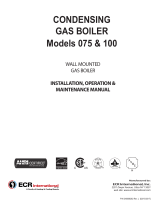
3
TABLE OF CONTENTS
Verify Contents Received ......................................2
Table Of Contents
.................................................3
Physical Data........................................................4
1 - Important Information
....................................6
2 - Introduction
....................................................7
2.3 Requirements Commonwealth Of Massachusetts.......7
2.4 Use Of Carbon Monoxide Monitor . ......................7
2.5 Designated Use ................................................7
2.6 The Unit Must Not .............................................7
2.7 Operational Features .........................................7
3 - Component Listing ..........................................8
3 - Component Listing
..........................................9
4 - Locating Boiler
..............................................12
4.1 Boiler Location Considerations .......................... 12
4.2 Clearances .....................................................13
4.3 Wall Mounting ................................................1
4
5 - Combustion Air And Vent Piping ....................15
5.1 General .........................................................15
5.2 Removal Of Existing Boiler From Common Vent System
......................................................................... 16
5.3 Denitions ..................................................... 16
5.4 Approved Venting Materials ............................. 17
5.5 Vent Termination ............................................ 17
5.6 Coaxial Venting Instructions ............................. 18
5.4 Coaxial Vent Screw Placement ......................... 18
5.8 Twin Pipe Systems .......................................... 20
5.9 Securing Twin Pipe Polypropylene Venting ....... 21
5.10 (3" / 80 Mm Only) Flexible Vent System ..... 24
5.11 Condensate Piping ........................................ 26
6 - Hydronic Piping .............................................27
6.1 General .........................................................27
6.3 Safety Relief Valve And Air Vent ........................ 28
6.2 Special Conditions .......................................... 28
6.4 Trim Piping .................................................... 29
6.5 System Piping ................................................ 29
6.6 External Optional Low Water Cut O ............. 31
6.7 Manufacturer Recommendation - Strainer ...... 32
6.8 Central Heating System ................................... 33
6.9 Domestic Hot Water Mode ................................ 33
6.10 Frost Protection Mode .................................... 33
6.11 Pump Protection ........................................... 33
7 - Gas Supply Piping .........................................34
7.1 General .........................................................34
7.2 Leak Check Gas Piping .................................... 35
7.3 Gas Orice .................................................... 35
8 - Electrical Connections ...................................36
8.1 General
.....................................................36
8.2 Install Room Thermostat
..............................36
8.3 Electrical Connections
..................................36
8.4 Access To Connection Block
..........................37
8.5 Main Supply Connection
...............................37
8.6 Install Room End Switch
..............................38
8.7 Optional Electrical Connections
.....................38
8.8 Indirect Storage Tank
..................................39
9 - Start Up Procedure
........................................40
9.1 Central Heating System Connections - Heat Only 40
9.2 Central Heating System Connections - Combi .. 41
9.3 System Start Up .............................................42
9.4 Fill Condensate Trap With Water ....................... 42
9.5 Control Panel ................................................. 43
9.6 Prior To Commissioning ................................... 44
9.7 Commissioning For The First Time ..................... 44
9.8 Automatic Calibration Function
......................... 44
9.9 Manual Calibration Function: ............................ 45
9.10 Deaeration Function ...................................... 45
9.11 Commission Set Up (Gas) - Changing The Type Of Gas
..................................................................................45
9.12 Chimney Sweep Function (Co2 Adjust) ......... 46
9.13 Combustion Adjustment Function (Co2%) ..... 46
9.14 Check Firing Rate ..........................................46
9.16 Description Of Parameters: Factory Settings .. 47
9.15 Parameter Settings ....................................... 47
9.16 Description Of Parameters: Factory Settings .... 48
9.17 Adjusting Maximum Heating Power............... 49
10 - Operating Instructions ................................ 50
10.1 Testing For Gas Leaks And Purging Gas Supply . 50
10.2 Boiler Operation ...........................................50
10.3 Central Heating Mode .................................... 50
10.4 Domestic Hot Water Mode .............................. 50
10.5 Frost Protection ............................................ 50
10.6 Pump .......................................................... 50
10.7 Low Water Pressure Sensor (Internal) ......... 50
11 - General Maintenance And Cleaning .............51
11.1 Beginning Of Each Heating Season ............... 51
11.2 Maintenance And Routine Servicing .............. 52
11.3 Component Replacement And Cleaning ......... 52
11.4 Draining The Boiler .......................................53
11.5 Draining The Heating Circuit ........................... 53
11.6 Hydraulic Unit (DHW) ....................................54
11.7 Cleaning The Cold Water Filter ........................ 54
11.8 Final Commissioning ..................................... 54
11.9 Final Assembly ............................................. 54
11.10 User Information ......................................... 55
11.11 Safety Flue Thermostat ............................... 55
11.12 Flue Pressure Switch (125-150 Only) ............. 55
11.13 Replacement Parts ......................................55
12 - Ratings And Capacities ................................56
12.1 Ratings And Capacity..................................... 56
12.2 Domestic Hot Water Specications ............... 56
12.3 High Altitude Ratings .....................................57
12.4 High Altitude Chart ....................................... 57
13 - Trouble Shooting .........................................58
13.1 Error Messages And Resetting The Boiler ....... 58
13.2 Anomalies Table For The Installer - Use This Table
To Report The Anomaly Values. .............................. 60
14 - Glossary ...................................................... 61
Appendix A - Wiring Diagrams
............................63
Appendix A - Wiring Diagrams
............................64
Appendix A - Wiring Diagrams
............................65
Appendix A - Wiring Diagrams
............................66
240011947 REV F, [05/15/2019]






















